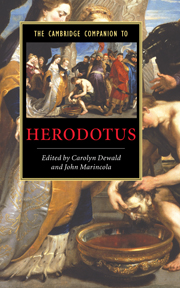Book contents
- Frontmatter
- Introduction
- 1 Herodotus and the poetry of the past
- 2 Herodotus and his prose predecessors
- 3 Herodotus and tragedy
- 4 The intellectual milieu of Herodotus
- 5 Meta-historiē: Method and genre in the Histories
- 6 The syntax of historiē: How Herodotus writes
- 7 Speech and narrative in the Histories
- 8 Herodotus, Sophocles and the woman who wanted her brother saved
- 9 Stories and storytelling in the Histories
- 10 Humour and danger in Herodotus
- 11 Location and dislocation in Herodotus
- 12 Herodotus and the natural world
- 13 Herodotus and Greek religion
- 14 Warfare in Herodotus
- 15 Herodotus, political history and political thought
- 16 Herodotus and the cities of mainland Greece
- 17 An alternate world: Herodotus and Italy
- 18 Herodotus and Persia
- 19 Herodotus and foreign lands
- 20 Herodotus' influence in antiquity
- Glossary
- Timeline
- Bibliography
- Index
- Series List
9 - Stories and storytelling in the Histories
Published online by Cambridge University Press: 28 January 2007
- Frontmatter
- Introduction
- 1 Herodotus and the poetry of the past
- 2 Herodotus and his prose predecessors
- 3 Herodotus and tragedy
- 4 The intellectual milieu of Herodotus
- 5 Meta-historiē: Method and genre in the Histories
- 6 The syntax of historiē: How Herodotus writes
- 7 Speech and narrative in the Histories
- 8 Herodotus, Sophocles and the woman who wanted her brother saved
- 9 Stories and storytelling in the Histories
- 10 Humour and danger in Herodotus
- 11 Location and dislocation in Herodotus
- 12 Herodotus and the natural world
- 13 Herodotus and Greek religion
- 14 Warfare in Herodotus
- 15 Herodotus, political history and political thought
- 16 Herodotus and the cities of mainland Greece
- 17 An alternate world: Herodotus and Italy
- 18 Herodotus and Persia
- 19 Herodotus and foreign lands
- 20 Herodotus' influence in antiquity
- Glossary
- Timeline
- Bibliography
- Index
- Series List
Summary
Any reader who approaches Herodotus' great book with the conventional assumptions of what a modern, Western, post-Thucydidean narrative history is or ought to be - that is, expecting a generally austere concentration on political and military affairs, perhaps citing the texts of treaties, adducing inscriptional evidence, and so on - is likely to be disconcerted, if also delighted, by the way the text unfolds itself. One does not immediately see what is coming. The prospectus-paragraph sets out the project clearly enough. Two parallel clauses, the second of which reinforces, varies and amplifies the first, declare the author's aim as being 'to prevent the memory of human actions being obliterated by the passage of time, and to ensure that great and wonderful achievements, whether carried out by Greeks or by foreigners, are not denied their proper celebration'. It goes on immediately to define a more precise focus: 'to investigate why they (the Greeks and foreigners) went to war with each other' (praef.).
And indeed by the beginning of chapter 6 (say, in our terms, a couple of pages), Herodotus fingers the man who he is 'personally convinced' set the long series of hostilities in motion: Croesus the king of Lydia. Croesus was the first ruler to levy tribute from the Greek settlements on the west coast of Asia Minor; he was also, we go on to discover in the course of the first book, the man who made the fateful mistake of attempting an eastward expansion of his kingdom and suffered a disastrous defeat at the hands of the Persians, thus bringing Greeks and Persians face to face for the first time and setting the scene for the wars that would follow.
- Type
- Chapter
- Information
- The Cambridge Companion to Herodotus , pp. 130 - 144Publisher: Cambridge University PressPrint publication year: 2006
Accessibility information
- 32
- Cited by

